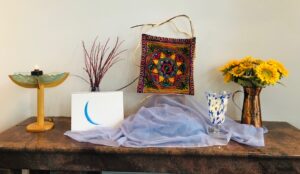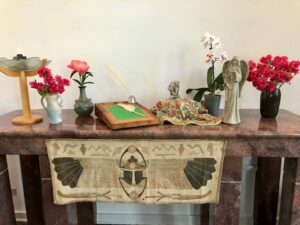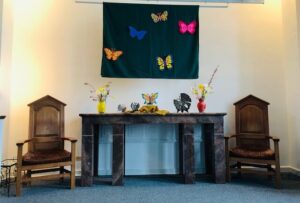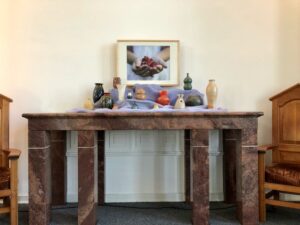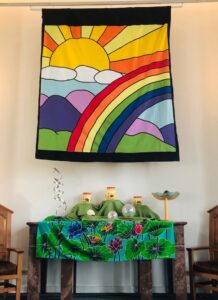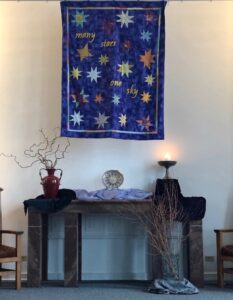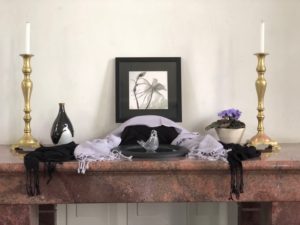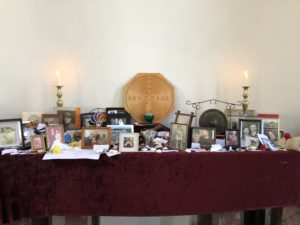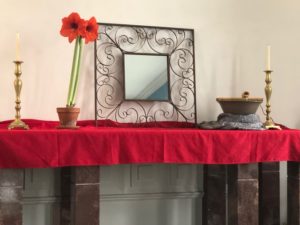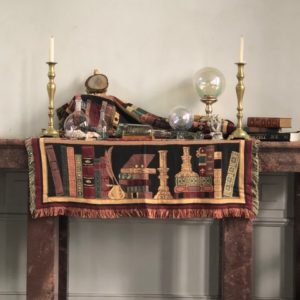The service was led by Rev. Alexandra McGee.
We made it. We made it to the two year anniversary after the tragic events of August 12 2017. In our town this year, grassroots organizations are teaming up with city organizations to educate, inspire and celebrate what is good and true about this town. Yesterday I was at the downtown Pavilion where the Sing Out included people from many different faith tradition and backgrounds, where police officers sat with other people, and kids ran around safely playing. The leader, Pastor Alvin Edwards, reminded us that this City is resilient, this city will not be divided, and this nation can grow and hope together. He reminded us that our resilience can be a gift to other cities. Gilroy. El Paso. Dayton.
Don’t we, as much as any place, know the pain of hearing the name of our city turned into a political talking point? And know the pain of fear and loss? Know the pain of helping those who died and those who were injured by violent hate?
In 1978, the mayor of San Francisco, Harvey Milk was assassinated. He was a gay man who had inspired the gay community, and now they were terrified and confused. Some of them decided to gather in the streets and march together, building their courage and hope together. One among them, a singer named Holly Near, created words for their experience: We are a gentle angry people, and we are singing, singing for our lives. We are a gentle angry people, and we are singing, singing for our lives. She had more verses…about gay and lesbian together, but as she stood on the street that night, she realized they were surrounded by allies, so she changed in on the spot to gay and straight together. There are more verses, young and old, a land of many colors. Two years ago, Holly Near was at yet another rally, yet again a time when hope was needed in the face of tragedy, and she said she had updated the lines yet again: we are all in this together. We are all in this together. Will you sing that with me now?
We are all in this together, and we are singing, singing for our lives, we are all in this together, and we singing, singing for our lives.
This is a gift we have to offer people in other places who are still in shock after their loss. There are many ways we can show them hope, and one small way is to send them cards. Two years ago, our congregation received so many cards from other UUs around the country that it filled a whole basket. So, I suggest we write cards to the UU congregations in places that experienced tragic shootings in the past few weeks. There is a table set up in the social hall. Please come after the service and sign a card.
This leaves us with the question: why do humans harm each other? Why do humans become divided in their communities? What is at the root of separation?
Why would a person want to hold on to a gun and point it at others? In the movie The Black Klansman, filmmaker Spike Lee portrays characters who want to have a sense of meaning and inclusion. They want to have a purpose in life. And a connection to others. Can you relate to those universal human needs?
In the movie, he shows how the Klan provided that for some people. The Black Power movement provided that for others. The distinction that he portrays is how one movement unites to limit others, while the other movement unites to lift up others.
Perhaps the problem is in the human desire for security. There is a rational and necessary reason to protect young and vulnerable people. There are some types of security that are real. But, in the human desire to protect ones home, ones offspring, sometimes one builds walls that don’t need to actually be there. And, deeper down, in one’s self, humans sometimes build up ego to an extent that we are trying to preserve a sense of self that doesn’t need to be there.
Many world religions say that ultimately, we are one. The opening reading told us: All living substance, all substance of energy, being and purpose, are united and share the same destiny.
I believe that.
But some days it just feels like philosophy, like theology untethered.
What really helps in times of sorrow, what really helps in times of lament, what really helps in times when the heart is growing cold and bitter, is something concrete. Something concrete like a kind word, like a helping hand. Those things help the receiver, and the giver.
So, on this morning, I am encouraging each of us to consider what concrete things we can do. And to be concrete in the plan—an action, a timeframe, and an accountability partner.
Despair can more easily grip a person who is not active.
So, I have some ideas:
One: Last week Barack Obama challenged his fellow citizens to contact their elected representatives about gun violence. To say that laws are needed to mitigate the harm being done in this country.
A second idea: Two years ago, on the morning after August 12th, ministers from around the country wrote to me and Erik, saying, what can we do to help? And the answer from my heart was: teach the children about racism and give them language to speak truth. And it is still needed.
A third idea: each year this congregation is part of a local effort of congregations to identify issues for policy change. This effort is called IMPACT, and has concrete steps to do together.
A fourth idea: what do you know about your particular gifts and talents? What do you know about your particular neighborhood or workplace or social scene, and what do you have to contribute to decrease ignorance and increase safety?
Now, please take a moment of silence and consider these ideas and pick one that you think you can do in the coming month. ……….envision where you will do it…….envision any other people involved………consider how it would impact your budget or calendar…….
Now, having spent that time thinking inside your head, I am challenging you to say it out loud to someone. Right now, please find a person near you and for three minutes, share your plans. That’s three minutes total for both of you. Go.
Thank you. Thank you. After the service, if you want to share contact information with your buddy, that can be a way to report to them that you did follow up on your action plan, and ask them how it went for them.
My friends, these actions add up over time. Step by step the longest march can be done. Many stones to form an arch, but singly, none. And by union, what we will, can be accomplished still. Drops of water turn a mill. Singly, none. These are words to a song sung over the last few centuries that I have seen attributed to various sources, including a Mining Union rulebook.
Consider that. The miners forming unions to get rights to work in safety. Every era has its challenges, its heartbreaks. We are in our current era. We have role models who have come before us.
The writer Toni Morrison died this week. One of the books she is known for is Beloved. She received an award for it from the Unitarian Universalist Association in 1988, and at that time, she gave a speech about why she wrote this book about slavery. She said that she was trying to make up for the absence of a place to go to remember and honor the slave journey. She said that she felt a YES inside herself that she needed to do this work of writing. Here are her words: “The primary conviction one has when one begins is that it is absolutely necessary. The secondary certainty is that I alone am the one who can do it. How delusional. It’s a strong feeling, but is it also necessary fiction one needs to construct in order to do the work? The work which takes so long, which one has to feel one would have just as driven to write without readers, without publishers? And my answer’s always, “Oh yes. Yes.” (sourced from UUA website)
Toni Morrison was willing to look pain in the eye and see reality for what it is. Seeing reality is empowering. Looking away from the pain in our country right now is tempting. Looking away from pain in personal relationships is tempting. Suffering comes from pushing away pain. But when a person accepts reality, they free up the energy that was being used to push it away. When we stand in this present moment, not wishing for the past, we have more creativity to offer the future generations. Our country seems to be in a new normal of climate change and gun violence. So, it is time for new strategies and new actions.
My friends, I hope that each of us can find our inner Yes, and take the steps, and do the work of rebuilding, reweaving, and making this earth a place for the next generations to thrive.
As always, I used this script as a guide, and I changed and clarified the words while speaking. If you are planning to quote this in writing in another place, please check with me first. Thank you.
—Rev. Alexandra McGee

